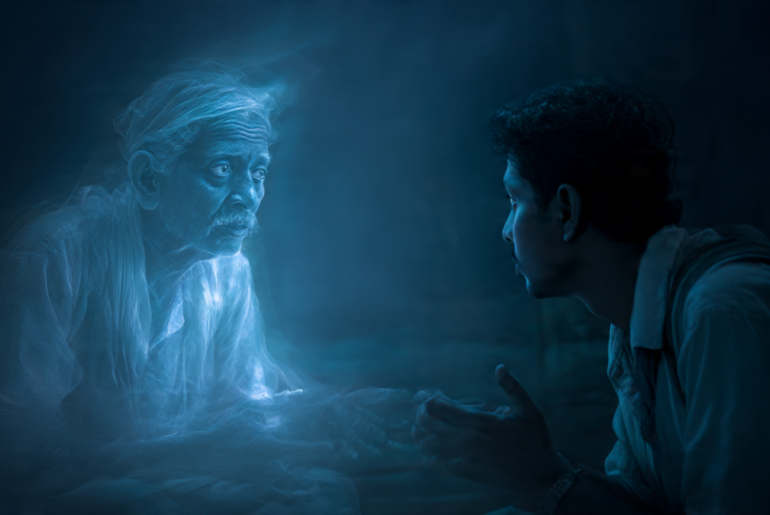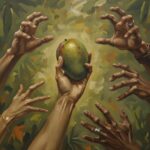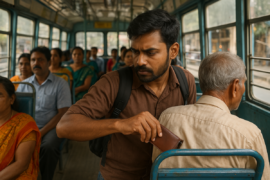A sunny Friday morning in May. It is only nine o’clock, yet the heat is already oppressive. Kolkata, the City of Joy, simmers under the early summer sun. The streets are alive with movement—office-goers huff and puff, jostling for space in overcrowded private and state-run buses. The honking of yellow taxis blends with the distant wail of trains, creating a symphony of the city’s relentless energy.
Soumen works at a small sales firm near Golpark. He is twenty-eight, living with his parents in a modest rented apartment near the 8B bus stand in Jadavpur. Today, he has overslept until eight, awakened only after his mother’s shrill shouts pierced the air, as if she were tearing the roof apart. “Soumen! Wake up! You are late again!” she yelled, pounding on the wooden door.
His job demands daily door-to-door visits, exhausting both body and mind. He has been searching for a better position for months, one less physically demanding, but fortune has so far eluded him. Yet, he cannot afford to be idle; his parents depend on him for the rent and daily expenses.
By 8:45, Soumen finally gets ready and heads toward the 8B bus stand. His usual routine involves taking an auto, a ten- to fifteen-minute ride that spares him the exhausting walk. But today, to his irritation, the auto union has called a strike demanding a fare revision. Not a single auto is in sight. In winter, he might have walked, enjoying the streets, but now the heat is suffocating. His shirt clings to his back; sweat drips from his forehead even before his first step into the street. Reluctantly, he heads toward the bus stand, knowing he has no other choice.
At the bus stand, a long queue forms for the E1 bus, which travels from Jadavpur 8B to Howrah Railway Station. Standing is not allowed; only passengers with available seats may board. Soumen joins the line, adjusting his damp collar, feeling the heat pressing down on him like a weight. A voice calls from behind: “Babu, does this bus go to Howrah Station?”
Soumen turns. A tall, frail man in his late forties stands there. He wears a threadbare white shirt and black trousers, clearly worn from years of labour. His dark complexion, greying hair, and a small slanted scar on his forehead speak of hardship endured. A battered briefcase hangs from his left hand. His eyes are anxious, pleading.
“Yes, it does,” Soumen replies.
“Thank God! I am terribly late!” the man sighs.
The queue moves forward, and Soumen eventually reaches the bus gate. “Only one more passenger can board,” the conductor announces. As he steps onto the bus, the man pleads, “Babu, please… let me board instead. I have a job interview today. If I miss this bus, I won’t make it!”
Annoyance rises in Soumen. Though he has no assignments until ten, he cannot bear the thought of waiting for another bus in this heat. He lies quickly: “I’m sorry, dada. I have an important meeting in half an hour. I cannot afford to be late.”
He climbs aboard, taking a window seat at the back. The bus engine hums to life. As it pulls away, Soumen glimpses the man walking away, sweat streaking his face, hoping to find another bus. A twinge of guilt pricks him, but it fades quickly, replaced by the fleeting pleasure of the breeze and the familiar sights of the Dhakuria flyover and roadside pan shops.
The office near Golpark is small and unremarkable. Soumen’s day stretches ahead like an endless path of doors and faces. The summer sun has not relented; even inside, the heat clings to the walls. By 10 a.m., he is out on the streets with a worn leather bag of samples, moving from building to building. Each knock, each refusal, drains him. Sweat pours down his back; the sticky humidity clings to his skin. Street vendors cry out, offering iced lemon water and chaats, but he barely notices.
He thinks of his father, bent over work in their rented apartment, of his mother’s constant worry. Every rejection feels like a reminder of his own failures. He imagines a better life—regular hours, air-conditioning, comfort—but the city feels too loud, too hot, too indifferent for dreams.
By mid-afternoon, his throat is raw, his legs aching. The sun beats down mercilessly; the air shimmers over asphalt, blurring street signs and bus stops.
When Soumen finally finishes tidying up, organising reports, and locking away equipment, it is 10:30 p.m. The office lights flicker, casting long shadows across the dusty floor. Only the security guard remains, nodding sleepily at the gate. Every muscle in Soumen’s body protests as he slings the bag over his shoulder. His throat is parched, his legs heavy, his eyelids weighted. Exhaustion presses on him like a physical force—yet he still must walk to the bus stop.
Stepping out into the night, Soumen is greeted by an eerily quiet city. The usual cacophony of horns, chatter, and street vendors has dissipated; even the air feels heavier now, sticky with the remnants of the day’s humidity. A stray dog pads silently across the street, sniffing for scraps, while the faint smell of incense from a small temple drifts in the distance, mingling with the faint scent of burnt parathas from a late-night food stall.
He saunters to the bus stop, each step a battle against fatigue. Twenty minutes pass at the empty bus stop. Not a single bus arrives. His impatience mounts, but the desire to reach his bed, to collapse and forget the day, drives him forward. With a deep, exhausted sigh, Soumen decides to walk. Each step feels heavier than the last; his vision blurs at the edges, and a dull ache radiates through his calves and back.
The city, so alive during the day, now seems almost spectral, shadows stretching long across the pavement. The sounds of distant trains and occasional horns punctuate the night, reminders of life continuing around him while his own energy falters.
By the time he reaches the middle of the Dhakuria flyover, Soumen’s body is on the verge of collapse. His head spins, and the world tilts dangerously. Darkness presses against his eyelids, threatening to swallow him whole. And then, as if from the shadows themselves, he sees a figure seated on the footpath, motionless but somehow commanding presence. “Please… help me!” he cries before everything goes black.
****
“Babu, babu? Are you alright? Please wake up, babu!” a distant voice calls, growing louder. A cold sensation touches his face—water. Soumen blinks, slowly regaining awareness. In the pale moonlight, he sees the figure crouched over him, sprinkling water onto his face.
“Here, drink some water,” the man urges. Soumen gulps half a bottle. His eyes adjust, and he recognises him—the exact tall, frail figure from the morning, the one whose plea he had selfishly denied.
“Are you going home now, babu?” the man asks softly. “You must have a hard job.”
Soumen feels shame pressing down like a stone. Despite recognising him, this man has helped him.
After a few moments, he finds words. “Thank you, dada! I… I owe you my life,” he whispers, every syllable weighted with emotion.
“It’s alright, babu. I was only doing my duty—helping a fellow human being,” the man says, smiling faintly.
Soumen rises slowly, dusting off his clothes. “But… why are you here so late? Haven’t you gone home?” His watch reads 11:15 p.m.
“No, babu. I will not go home tonight,” the man says, sorrow deep in his voice.
“Why?” Soumen asks, bewildered.
“I lost my job three months ago,” the man begins, his voice heavy with weariness. “Since then, every day has been a struggle. My son… he has been sick for months, his body wasting away before my eyes. Every day I watch him suffer, knowing I cannot afford his treatment. No relatives are willing to help us. They have all turned their backs. And my wife… she scolds me every day for failing to provide, for being useless in the eyes of my own family.”
He pauses, his hands trembling as they clutch the worn briefcase. “This interview today… It was my only hope. I thought, if I could just get the job, I could beg for some advance money and admit my son to a hospital before it was too late. But I missed the first bus this morning. By the time I reached the Dhakuria flyover, drenched in sweat and desperate, the company called. They berated me for not arriving on time, and over the phone itself, they dismissed me. They told me there was no place for a man like me in their company.”
Soumen falls to his knees, overcome with guilt. “Please forgive me, Dada! I… I should have let you board. My selfishness… it caused all your suffering! Everything might have been different!”
The man lifts him gently. “It is not your fault, babu. How could you know? You were in a hurry, too. Everything is alright now. I have accepted my fate. It no longer matters. Go home. Your family is waiting. Don’t worry about me. I will be fine.”
“What is your name, dada?” Soumen asks, unable to hold his curiosity.
“Samir Kundu, babu,” the man replies, offering a faint, weary smile—one that carries both resignation and kindness—before stepping back. For a brief moment, Soumen wants to say something. But his throat tightens, and the words never come. The man turns away, his silhouette shrinking with every step, until the darkness swallows him whole, as though the night itself had claimed him.
Soumen slowly trudges home.
****
The next morning, Soumen sits at the table, sipping his tea and absentmindedly chewing on a slice of bread. The hum of the ceiling fan fills the silence, but his mind is still wandering in the shadows of the flyover.
Just then, his cousin Anirban drops by, as he often does on weekends, for a bit of idle morning chitchat. He settles into a chair, complaining about the relentless heat and the rising price of vegetables. Soumen nods along, offering half-smiles, adding a word here and there about office drudgery and the little miseries of the week. The two of them grumble about the city—how it never changes, how the same problems seem to return every summer, as though the streets themselves conspire to remind them of their weariness.
For a while, it feels like an ordinary Saturday morning.
But then, as their conversation drifts, Anirban leans back and says, almost as if sharing a bit of neighbourhood gossip, “Do you know, Soumen, my neighbour Samir Kundu… he’s gone. Took his own life yesterday morning.”
Soumen looks up at once, his hand frozen midair, the taste of bread suddenly gone dry in his mouth.
Anirban shakes his head, his voice weighted with sorrow. “He committed suicide yesterday morning. Missed a bus and was late for an interview. The company dismissed him outright, even before he could step inside. He’d been jobless for months, struggling to feed his family. His son has cancer… and his wife, poor woman, has nearly lost her mind in grief. No one helped him. No one stood by him. And yet… he was always the first to help others.”
The words settle like lead in Soumen’s chest. His pulse quickens as the truth unfurls, merciless and cold. The man who had lifted him from despair, who had steadied his faltering steps on the flyover, had already died several hours ago.
The realisation crushes him: it was no living man who saved him, but the spirit of one whose compassion outlived his suffering. The weight of shadows presses upon Soumen—heavier than the fiercest summer sun.





